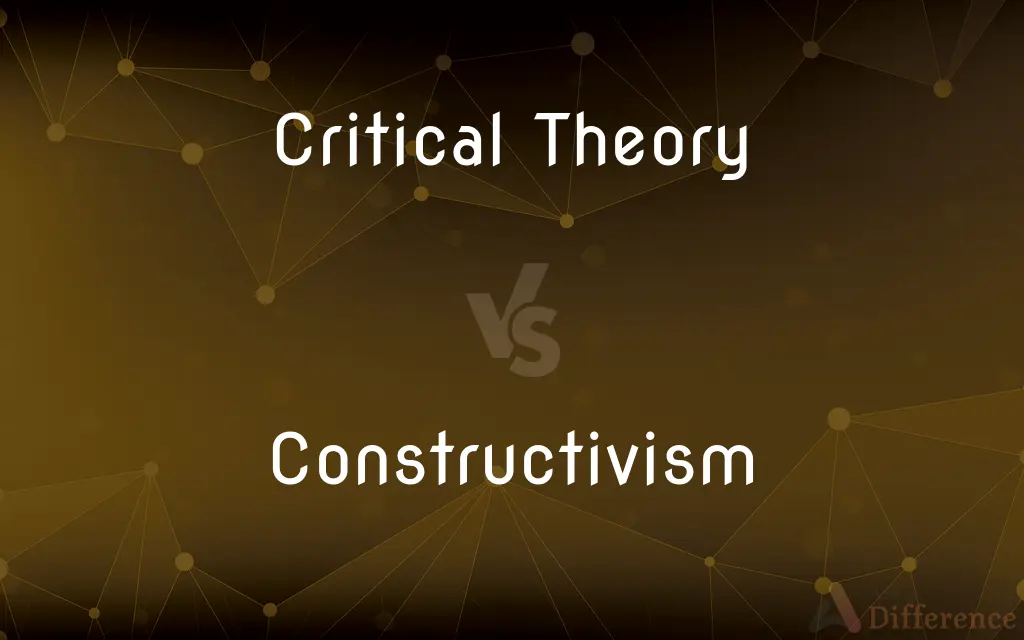Critical Theory vs. Constructivism — What's the Difference?
By Tayyaba Rehman — Published on October 26, 2023
Critical Theory examines societal structures seeking to emancipate oppressed groups, while Constructivism posits that knowledge is constructed by learners based on experiences.

Difference Between Critical Theory and Constructivism
Table of Contents
ADVERTISEMENT
Key Differences
Critical Theory is a social philosophy that delves into the analysis of society and the structures within it. It seeks to understand, critique, and change these structures, especially those perpetuating inequities. Constructivism, on the other hand, is a theory of knowledge that asserts that individuals construct their understanding and knowledge of the world through experiences and reflecting on those experiences.
Critical Theory often focuses on critiquing and changing society as a whole. It tends to spotlight power dynamics, inequality, and dominant ideologies, aiming to emancipate oppressed or marginalized groups. In contrast, Constructivism is more concerned with how individuals construct knowledge, emphasizing the idea that learners actively create and interpret information based on their prior knowledge and beliefs.
Rooted in the Frankfurt School, Critical Theory critiques areas like culture, media, and technology, pointing out how they might perpetuate societal injustices. This theory is less about individual knowledge and more about broader societal structures. Constructivism, stemming mainly from educational psychology, highlights the importance of active engagement, problem-solving, and the role of learners in acquiring knowledge.
In the classroom, Critical Theory might encourage students to question societal norms, narratives, and power dynamics, pushing for critical consciousness. Constructivism, meanwhile, would emphasize hands-on experiences, group discussions, and reflections, believing that students build knowledge through active participation and interactions.
While both Critical Theory and Constructivism share some parallels in advocating for active engagement—either with societal issues or the learning process—their primary focuses differ significantly. Critical Theory zeroes in on societal transformation, whereas Constructivism revolves around the individualized construction of knowledge.
ADVERTISEMENT
Comparison Chart
Primary Focus
Societal structures and their critique.
Individual construction of knowledge based on experiences.
Origin
Frankfurt School in social philosophy.
Educational psychology.
Application
Understanding and changing society.
Learning processes and education.
Central Concern
Power dynamics, inequality, dominant ideologies.
Active engagement, problem-solving, role of learners.
Classroom Implementation
Questioning societal norms and narratives.
Hands-on experiences, group discussions, reflections.
Compare with Definitions
Critical Theory
An analysis tool for understanding power dynamics and dominant ideologies.
Using Critical Theory, researchers uncovered the subtle propagandas in wartime broadcasts.
Constructivism
A standpoint that learning is an active, not passive, process.
Constructivism promotes the idea that students should be active creators of their knowledge.
Critical Theory
A theory emphasizing the emancipation of marginalized groups.
Feminist perspectives often draw from Critical Theory to challenge gendered power dynamics.
Constructivism
An educational philosophy emphasizing learners' active roles.
In line with Constructivism, the teacher facilitated group discussions to promote active participation.
Critical Theory
A framework from the Frankfurt School focusing on societal critique.
The Frankfurt School's Critical Theory remains influential in contemporary social analysis.
Constructivism
A theory positing knowledge is constructed from experiences.
Constructivism suggests that hands-on learning is vital for genuine understanding.
Critical Theory
A methodology aiming for societal change by questioning accepted norms.
Critical Theory plays a vital role in challenging the status quo in modern societies.
Constructivism
A view that knowledge isn't fixed but evolves with experience.
Embracing Constructivism, the curriculum centered on exploration and discovery.
Critical Theory
A philosophy critiquing societal structures to reveal oppression.
Critical Theory provides a lens to understand the deep-rooted biases in media.
Constructivism
The belief that prior knowledge shapes new learning experiences.
Stemming from Constructivism, educators often assess students' prior knowledge before introducing new concepts.
Constructivism
A movement in modern art originating in Moscow in 1920 and characterized by the use of industrial materials such as glass, sheet metal, and plastic to create nonrepresentational, often geometric objects.
Constructivism
(arts) A Russian movement in modern art characterized by the creation of nonrepresentational geometric objects using industrial materials.
Constructivism
(mathematics) A philosophy that asserts the need to construct a mathematical object to prove it exists.
Constructivism
A psychological epistemology which argues that humans generate knowledge and meaning from their experiences.
Constructivism
An abstractionist artistic movement in Russia after World War I; industrial materials were used to construct nonrepresentational objects
Common Curiosities
What is the main aim of Critical Theory?
To critique societal structures and emancipate oppressed groups.
How does Constructivism view teachers' roles?
As facilitators guiding students to actively construct their understanding.
Can Critical Theory be linked to any specific institution or thinkers?
Yes, it's notably linked to the Frankfurt School.
Is Critical Theory restricted to a specific domain?
No, it's applicable across various domains but commonly seen in social and cultural critiques.
In what educational settings is Constructivism most evident?
In classrooms emphasizing hands-on learning, exploration, and active discussions.
How might Critical Theory influence education?
By encouraging students to question dominant narratives and societal norms.
How does Constructivism view mistakes in learning?
As opportunities for reflection and deeper understanding.
Can Constructivism be applied outside of educational settings?
Yes, it can be seen in any setting where knowledge is actively constructed from experiences.
What's a core belief of Constructivism regarding knowledge?
Knowledge isn't passively absorbed but actively constructed by the learner.
How does Constructivism suggest new topics be introduced in classrooms?
By connecting them to learners' prior experiences and knowledge.
How does Constructivism perceive learning?
As an active process where learners construct knowledge based on their experiences.
How does Critical Theory view media and culture?
As platforms that can perpetuate societal inequities and power dynamics.
Is Critical Theory solely a negative critique of society?
Not just negative; it aims for positive societal transformation by addressing inequities.
Do Critical Theory and Constructivism have any commonalities?
Both value active engagement, either with societal issues (Critical Theory) or the learning process (Constructivism).
Are all Critical Theorists aligned in their perspectives?
No, various branches and interpretations exist within Critical Theory.
Share Your Discovery

Previous Comparison
Xbox 360 vs. PS4
Next Comparison
Supermarket vs. Discount StoreAuthor Spotlight
Written by
Tayyaba RehmanTayyaba Rehman is a distinguished writer, currently serving as a primary contributor to askdifference.com. As a researcher in semantics and etymology, Tayyaba's passion for the complexity of languages and their distinctions has found a perfect home on the platform. Tayyaba delves into the intricacies of language, distinguishing between commonly confused words and phrases, thereby providing clarity for readers worldwide.
















































